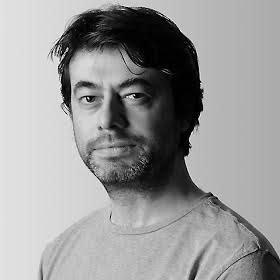The Neptunes’ Chad Hugo on synths, songwriting and his greatest productions: “Britney wants to write with us? It’s like I’m daydreaming”
Best of 2022: The semi-silent partner in N.E.R.D and The Neptunes on producing for Justin and Jay-Z… but not quite Michael Jackson
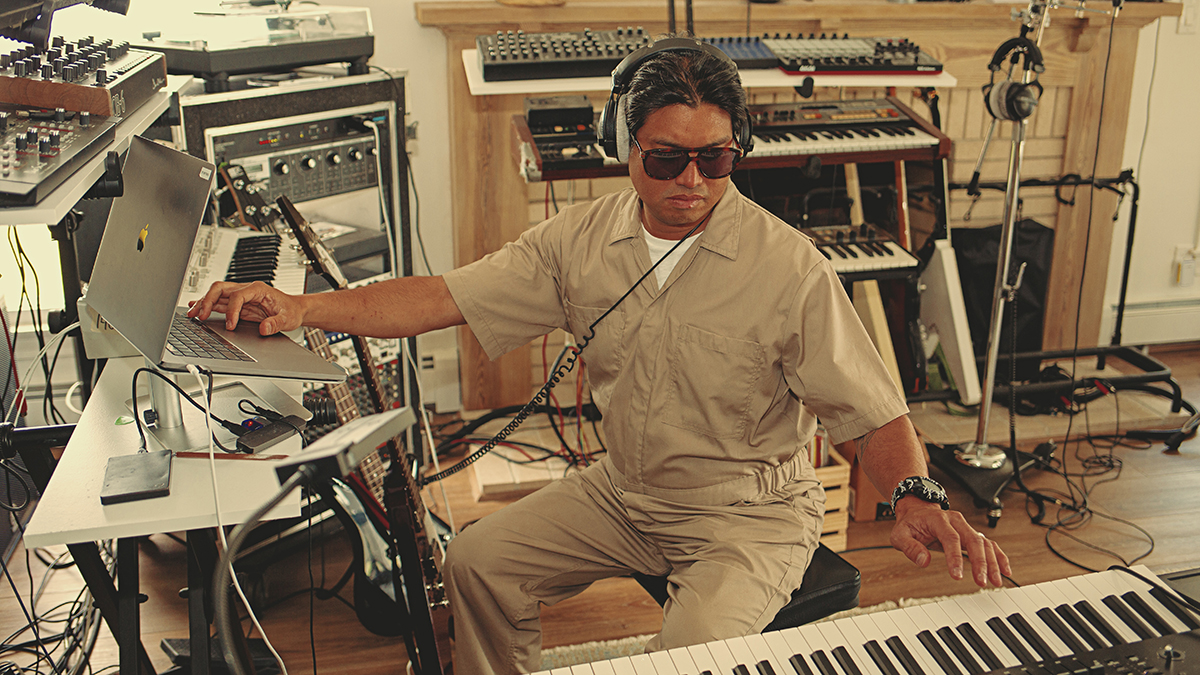
Best of 2022: As a crucial part of N.E.R.D, Chad Hugo has helped craft five of this century’s most innovative albums - featuring bona fide bangers such as Lapdance, Rock Star and She Wants To Move - but it’s his work with Pharrell Williams as production duo The Neptunes that’s even more stellar.
Bringing brave rhythms and spellbinding new melodies to artists as diverse as Kelis, Jay-Z, Britney Spears, No Doubt, Beyonce, Diddy, Mary J. Blige and more, The Neptunes transformed musical tastes, reset perceptions and delivered smash hit after smash hit.
Got Your Money, Shake Ya Ass, Good Stuff, I Just Wanna Love U, Hot in Herre, I’m A Slave 4 U, Rock Your Body, Drop It Like It’s Hot… You might not know it, but you’ve just spent the last 20 years a dial spin away from a Chad Hugo earworm…
Although famous for keeping a low profile, Hugo has just stepped into the limelight to be inducted into the Songwriters Hall of Fame in New York. We caught up with him in his home studio to discuss his award, talk gear and - of course - get some production tips.
Whereabouts are you at right now?
“I’m in my studio right now, in Virginia Beach. It’s sunny. 95 degrees.”
Tell us about being inducted into the Songwriters Hall Of Fame. How does that feel?
Get the MusicRadar Newsletter
Want all the hottest music and gear news, reviews, deals, features and more, direct to your inbox? Sign up here.
“Oh, it feels fantastic. I’m honoured to be part of it. To be recognised for work in the studio and considered a songwriter for the work that I do and the contributions I’ve made, I’m truly grateful. It’s awesome.”
Am I right in saying the ceremony and award was supposed to happen in 2020, but it got pushed back?
“Yeah, that’s true. It's taking place in New York. I’m getting inducted alongside The Eurythmics, Annie Lennox, Dave Stewart… There’s Mariah Carey… It’s pretty awesome.”
Tell me about your relationship with gear. Some treat it like it's just a tool, but others love their gadgets. Which are you?
“Both. I was always fascinated by robots and things when I was a kid. My Uncle Marty gave me a Game And Watch; I must have been maybe six or seven years old. It was called Egg Hunter or something. It really kept me company. And then I got into Nintendos… And Casios. I started with Casio keyboards, the MT series. And later I had one with the pads.”
So, what do you have around you right now?
“There’s a few keyboards. I just repurchased my first official synthesizer - a Sequential Circuits Multitrack. God rest Dave Smith, man. That really taught me how to use the synthesizer. That’s my favourite. It’s got a sequencer in it. We were in California in Marina Del Rey and I saw it and bought it. It’s been retrofitted with something extra inside so it’s boosted up.
“There’s also a Juno-60 that I got from the Clay Garden Studios in Norfolk here in Virginia. My friend gave it to me in exchange for some sax parts. That’s always a great go-to for a synth string sound.
“And I’ve got my trusty Access Virus TI Polar, there’s the [Dave Smith] OB-6, the Dave Smith P12 and a Prophet 08. I’ve got a Dave Smith Evolver, too. Then there’s my [Roland TR-66] Rhythm Arranger and I’m using a Korg Kronos as a controller keyboard. It’s fabulous.”
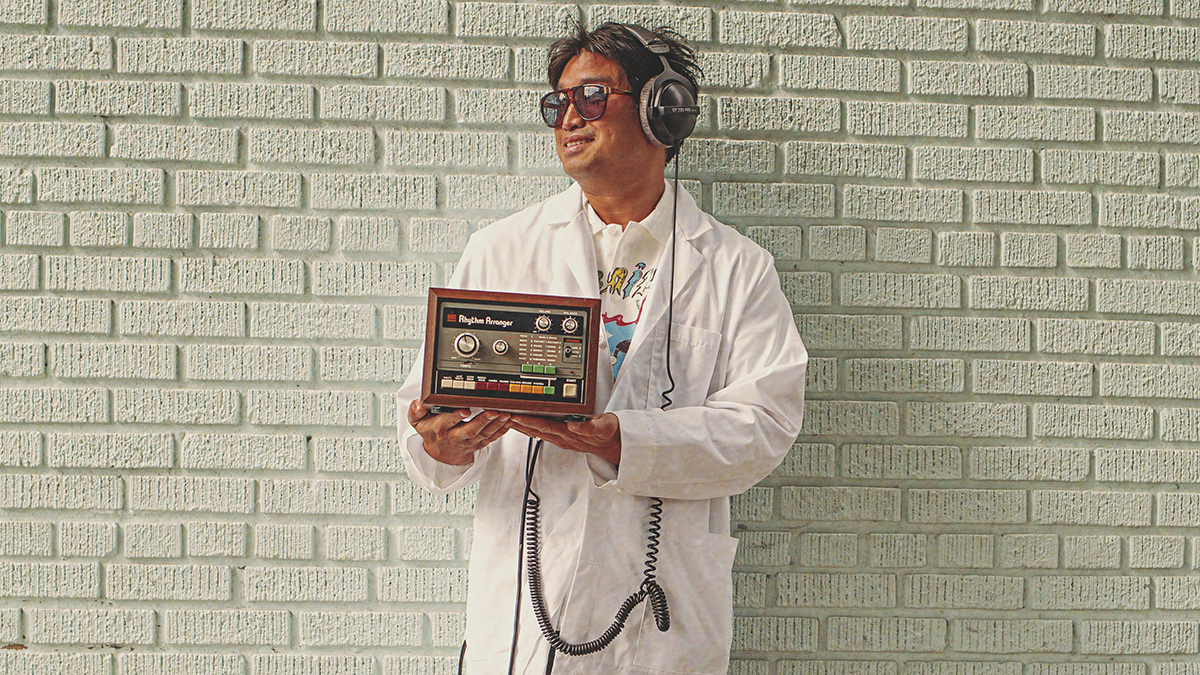
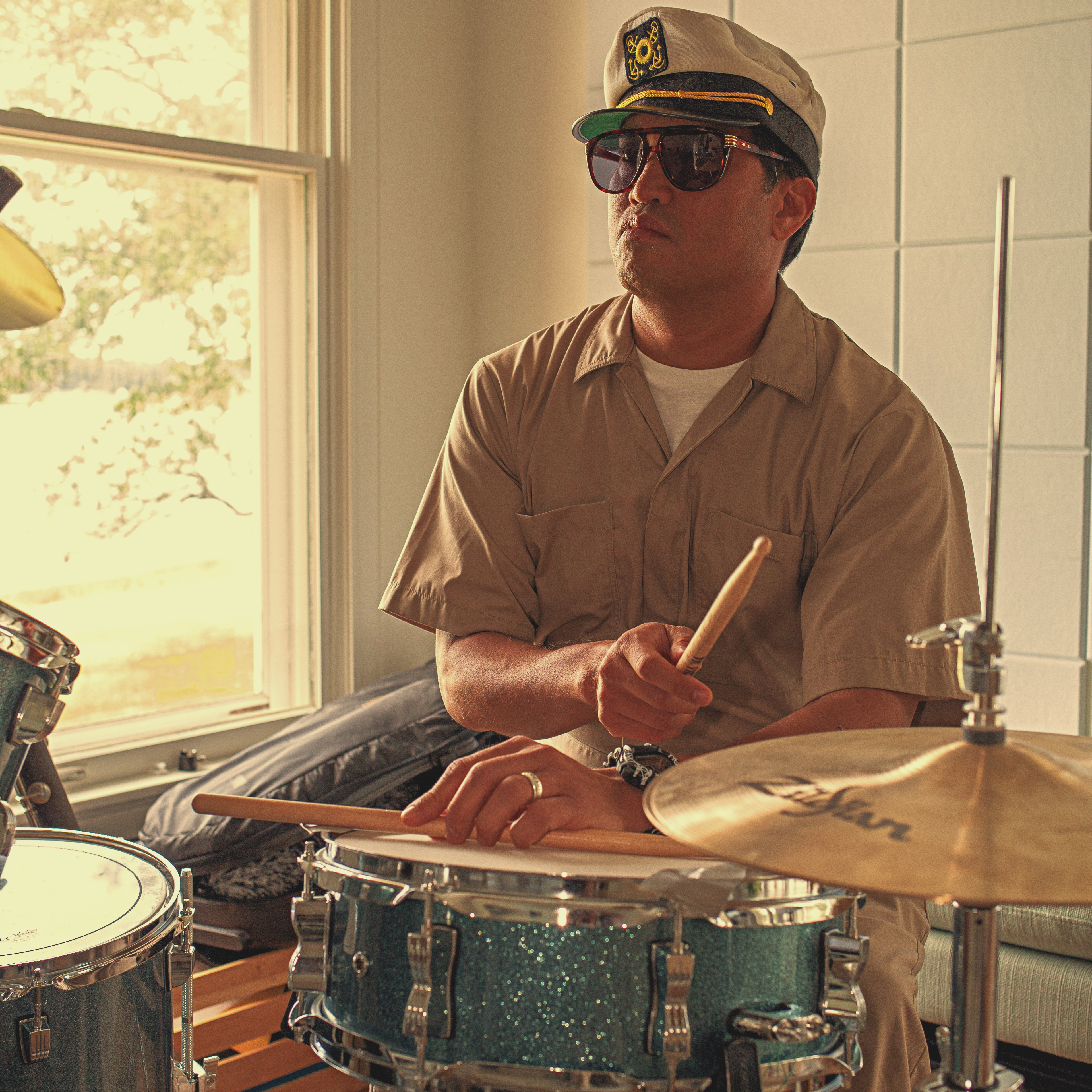
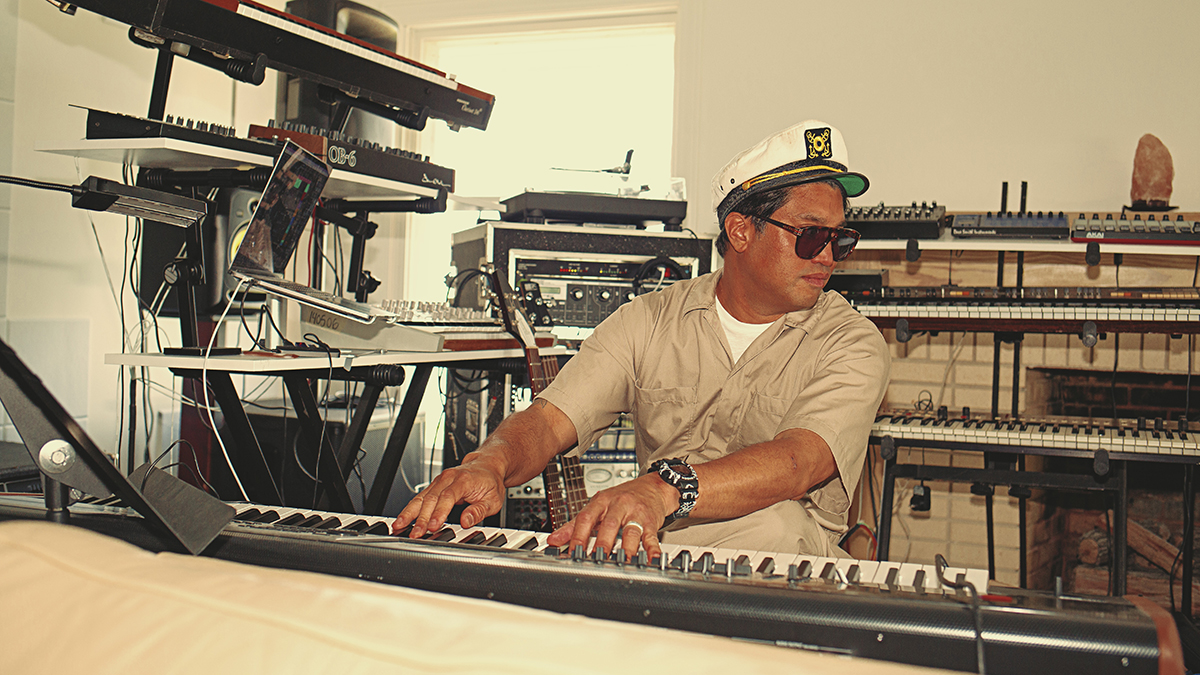
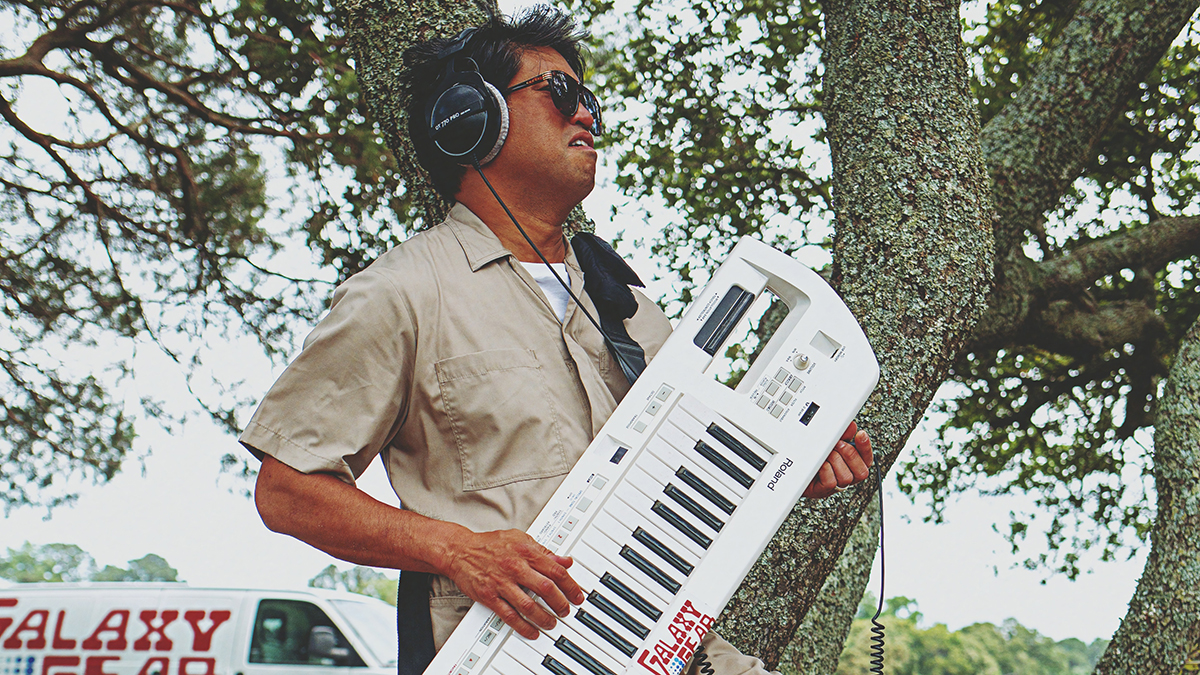
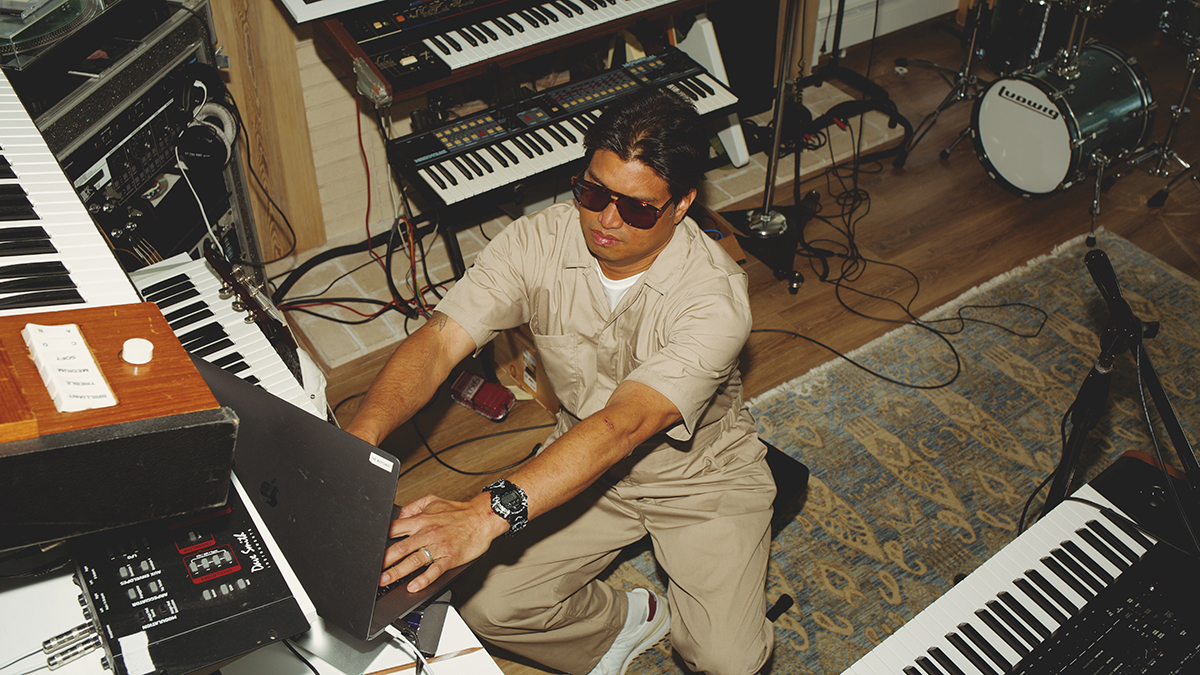
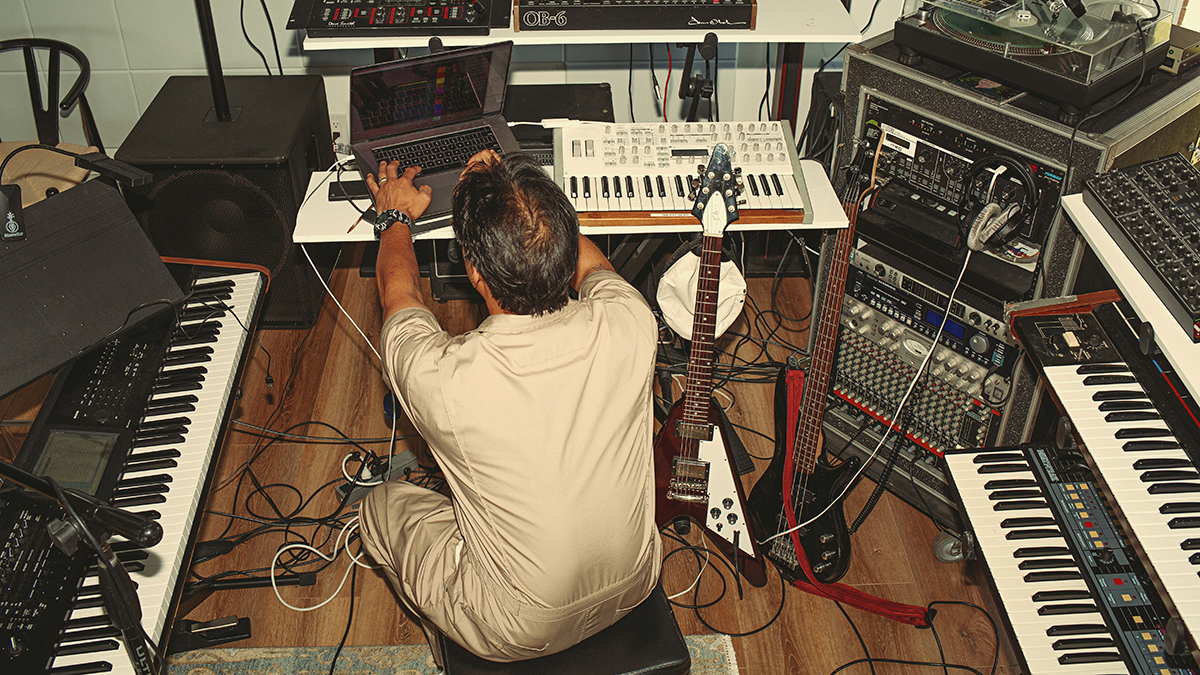
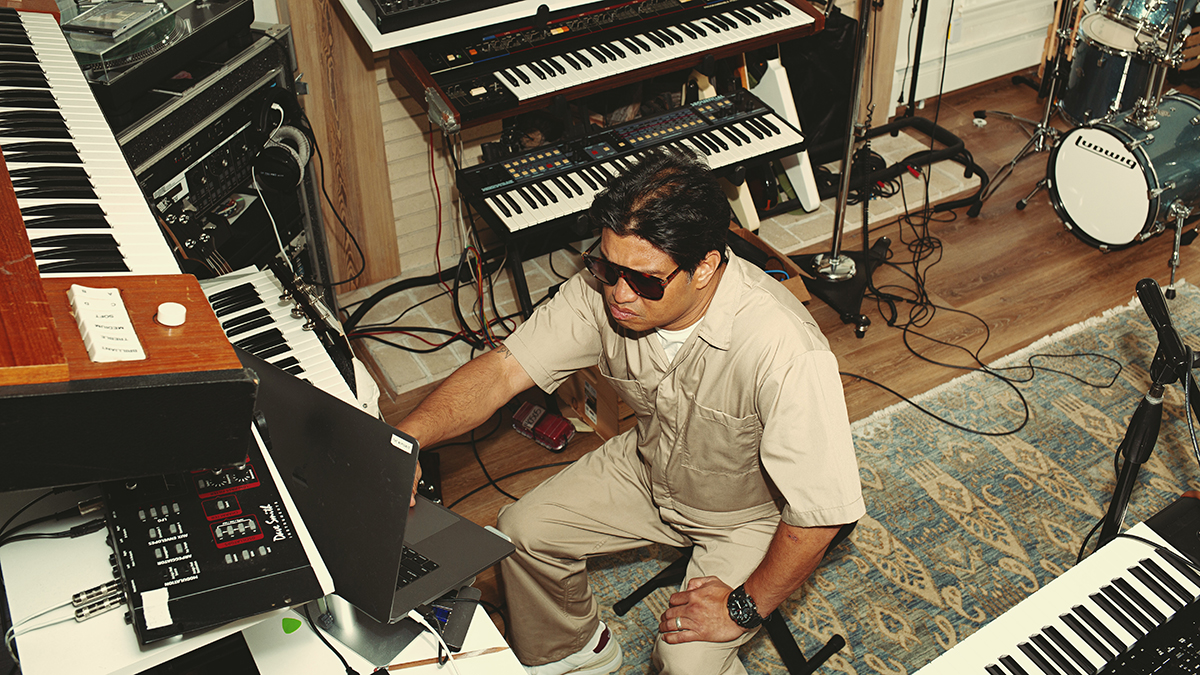
What DAW do you like to work in?
“Right now I’m into Ableton [Live] but before that it was Logic. That loop function… You can just loop away and it’s easy. Every DAW has its own advantages. I like this, but I like that… But Ableton, with those sounds, is great.
“There’s a soundpack on Splice that I was endorsing for a while and people have put some stuff together using those sounds.”
Is your home studio just for trying things out, or do you do full recording there, too?
“It’s for trying out projects. There’s a microphone and I’ve got the Tascam DS-D98 for recording. I’m a morning person, I get up because I have to so this is my nine to five. Though sometimes I take the weekends off.”
What’s your go-to instrument every morning?
“Most of the time it’s the saxophone. I kinda play a few scales and meditate with my breathing. It helps with my asthma. Then I strum a bit on the guitar, an old Gibson Flying V.”
So how did you first get into music?
“Record shopping. Going into record stores and being fascinated by the charts. I would go into Roses, which is the five and dime store around here, and pick up 45s. Everything from pop music to music from the dance shows.
“The first record I ever bought was Star Wars Moog… The Moog version of Star Wars. It was dark blue and it had generic writing - ‘Star Wars’ - and I thought it was the real one. I picked it up… And it was not what I expected. I was fascinated by it. [sings the Star Wars theme in a ‘70s synthy tone]
Right now I’m into Ableton [Live] but before that it was Logic. That loop function… You can just loop away and it’s easy.
What did you start out recording on and who were you recording on it?
“I had the four-track, a Tascam. That was like 30 years ago. We recorded Clipse, who were a local rap group. We started with the four-track, then we went from a 16 [Studer A] 80 to an 18 80 to a 24 80… What It Is by Busta [Rhymes] is all recorded on that 16-track 80.”
Producing as part of The Neptunes. What’s the division of labour?
“Well, it’s always a 50% thing. When we started out recording I was the guy with the equipment. And over the years I came to be overseeing the sound palette… Adding beats and drops. Fixing frequencies here and there with the engineer. Maybe some tonalities. I look after the technical stuff. I’d take that responsibility. But it’s whatever the vibe is. We all have our influences and the music we listen to. It’s whatever I can bring to the table for a particular project.”
Let’s talk about particular projects. The Justified album with Justin Timberlake. That’s an amazing piece of work. How did you hook up with Justin?
“As The Neptunes we’re managed by Rob Walker who resides in New York and he got us together. Justin flew down to Virginia and we had spent some time driving around. We went to the studio and we brought up some ideas, to see where we were at. We wanted to kind of modernise a Michael Jackson type of sound. It’s awesome that you would bring that up, because it’s awesome that it’s stood the test of time.
“It was all with the [Ensoniq] ASR 10 and the [Akai] MPC60… Chopping up drums, loading the sounds, having the sound palette. All recorded at Master Sound Studio here in Virginia Beach.”
There’s a story that those tracks were originally written for Michael Jackson. How come he didn’t record them?
“Yeah. It was crazy, man. I had no idea what was going on. We just shut up in the studio and it was dope to be working with him. California was cool. We spent some time at The Jacksons’ place, we were writing for some of his relatives, in the studio. It was pretty crazy.”
But the tracks with Justin came out just great.
“Yeah. Everything we did was a smash.”
And Britney too. Tell me about Slave 4 U. That was a big deal as it was her first track without Max Martin and the Cherion team.
“I love their tunes. They get played on the radio all the time. I like Max Martin’s stuff. But we wanted to make people dance, keep them on the dancefloor and keep them chanting along. It’s always a big surprise when something like that happens. Britney wants to write with us? And be part of these sessions? It’s like I’m daydreaming or something.”
Tell me about writing as a team. What’s the dynamic there? How does that work?
“Depends on how you look at it. I’ll spend time ‘off hours’ with the engineer. We’re loading sounds and chopping up drum samples. A lot of time is spent on that. And for me, I like to keep up with chord changes. Even to this day I’m still learning chord changes and chord progressions. If you had a chord progression I’d be like ‘Tell me what this is, it’s awesome’. Let’s share this moment so we can play the song together.”
Has there been a moment in the studio that’s been a favourite?
“I Just Wanna Love U by Jay-Z was a banger. I flew in to make drops on the song and maybe adjusted some levels. That became a smash and I love it to this day. It’s just great to be part of The Neptunes production entity. That was a dope song and when it came out I thought ‘Damn, this shit’s gonna be a banger’, and lo and behold it was.”
Is there a favourite studio that you like to record in?
We created a lot of hits at Master Sound with The Neptunes - also Sarm in London was a great studio. And I attribute hit-making to places like Right Track in New York in the ‘90s and early 2000s. Places like Sound On Sound in New York… Conway Studios… They have great foliage and botanicals outside.
“But right now I like to work here. These are tools [gestures to his studio]. These tools can travel with you if you find the time. It’s really all about accessing your experiences and your knowledge and just putting that down. For whatever project you have in mind. Whether it’s a project for school or it’s a song. It’s really up to you. There’s so many things out there, there’s so many platforms. There’s something I’ve just seen, the Audigo? It’s a box and it syncs up with your phone and you can split up the files and you can edit it in your computer later. It’s pretty sick.”
Tell us about working with the big names in the studio. What’s your routine for getting ready for a new project?
“I always listen to their repertoire from the past so we can try to help out in making something new. And hopefully they would appreciate the ideas that we present to them and we can catch a vibe and record something.
“Then you just feel the energy of the room and be available to provide the skills they need. Sometimes there are people where I’d love to work with them and I’ll just play a Moog bass and some saxophone and do some Melodyne… And there. That’s my skill. And hopefully they’ll choose to work with me.”
Tell us a trade secret. Something you always do on a track.
“There’s an art to stitching a song together. Placing drops. Muting things. Orchestrating like a conductor would. You address different sections of the orchestra. So you say ‘Louder here on the flutes’ or ‘Louder here on the kick drum’. ‘Stop here’. ‘Mute there’. On mixdown you’ve got the console and the mute buttons and so you perform the drops.
“I used to watch Teddy Riley do it. He’d get into the vibe and he’d nod his head, and on the SSL when you hold down the mutes there’s like a spring action so when you want the mute you… lift up! With the [Akai] APC40 and Ableton you tap it and it’s in, then you tap it again and it’s out. But with the old consoles you have to hold them down first… aaaand lift up! Which is kind of a cool motion. It’s like sleight of hand. It’s like magic.

“When I used to track vocals there was a lot of punching in and out. Nowadays it’s all about comping and bouncing around, people doing finger gymnastics and multi-tracking, flying stuff around, which is one method. I prefer to make it just one track and get it right.”
Do you prefer the classic gear or is it great that everything is in the box these days?
“There’s definitely a vibe from the old ‘boards. And playing keyboards helps. Being able to space your fingers out for the old ‘boards. Taking the knowledge out of that and applying it to ‘in the box’ is good. Right now I’m using the APC40 and using that into Ableton.
Has the new tech made things easier or harder would you say?
“Oh, I was making music faster when I didn’t have so many options! When you’re in the cloud it’s almost like you’re in a mental cloud, y’know?… So before, everything was analogue. It’s there. You see it. You push the button. But now you’re part of the cloud you have to go and upload this, and download that, and bounce this… There’s all those types of things that usually an engineer was taking care of back in the day. But since everyone’s their own engineer, teaching themselves on YouTube… But to each their own, y’know?
“I’m just grateful to be here. These days I’ve got my Yamaha speakers there. They’re pretty much portable and ready to DJ. One day I’ll have Augspurgers in here but right now it’s all made to carry out.”
Do you still DJ much?
“The other day we had my son’s birthday party and we had the JBL Eon battery-operated speaker outside and it was like ‘woah, I’m busking at my kid’s birthday party’. I think the parents got a kick out of it.
I was making music faster when I didn’t have so many options!
“It’s a great experience to have that interaction with people. Especially when you’re playing something they know. That’s even better! I used to play at the beach, here at the oceanfront. Back in the day it was totally turntables and a mixer. I’d play old-school, disco, hip-hop.
That’s one of the things I miss about records and mixes. We used to have acapellas and instrumentals that were available for DJs to fool around with. That was a thing back in the day. But with the digital age, you have to go around websites… It kinda feels like everything’s broken up.”
How do you know when a track is done? How do you know when to stop?
“When you can play the track over and over again and not get tired of it. When you have to quit on it deliberately. When you have to say ‘It’s over. It’s done’. From my point of view it’s about going to the club and listening to it. You work on it, then it’s played, and you see that all the nuances were appreciated and put into the song and taken note of, and you can see that this is dope and people are appreciating it.”
What do you enjoy listening to right now?
“Right now I’m listening to the music that my son listens to, like Cuphead and game music. Sounds that are cartoonish and wacky. I get some good ideas. The production is modern and cutting-edge but they’re just having fun with it and I have a lot of respect for those guys. It keeps the kids interested. And - I’ll admit it - I listen to 1st Wave on Sirus XM.”
What would you like to do next? Who would you love to work with?
“I think it’s happening right now. This is a big break for me. Talking to you about this. Yeah, man! I used to pick up Electronic Musician all the time at Barnes and Noble.”
What are you working on right now?
“I’m working on different sounds and putting things together. There’s a SoundCloud I have… I’ve never told anybody about this. Just to get [music] out, I put it there. It’s just some stuff I did. Updates. I put stuff out and listen to it later. It’s like a testing ground for me. But that’s my alias where I try stuff.”
Chad Hugo will be inducted into The Songwriters Hall of Fame on June 22nd 2022. Find out more here. And check out Hugo’s secret SoundCloud alter ego here.
Daniel Griffiths is a veteran journalist who has worked on some of the biggest entertainment, tech and home brands in the world. He's interviewed countless big names, and covered countless new releases in the fields of music, videogames, movies, tech, gadgets, home improvement, self build, interiors and garden design. He’s the ex-Editor of Future Music and ex-Group Editor-in-Chief of Electronic Musician, Guitarist, Guitar World, Computer Music and more. He renovates property and writes for MusicRadar.com.
“Do you dare to ditch those ‘normal’ beats in favour of hands-on tweaking and extreme sounds? Of course, you do”: Sonicware CyDrums review
“Excels at unique modulated timbres, atonal drones and microtonal sequences that reinvent themselves each time you dare to touch the synth”: Soma Laboratories Lyra-4 review
